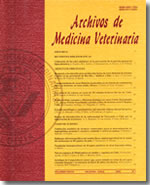Microsatellite loci and paternity analysis in Nubia and Boer goats
Main Article Content
Abstract
SRCRSP (Small Ruminant Collaborative Research Support Program) loci are polymorphic 100-300 base pair-long microsatellite sequences of repeated dinucleotides that can be amplified by the polymerase chain reaction (PCR). Alleles of a given locus are the PCR products of unique length amplified with a set of specific primers. SRCRSP loci have been used to identify individuals but not to assess paternity in goats. We have developed a method to assess caprine paternity by polymorphism analysis of SRCRSP loci in a herd of 20 goats from two breeds, nine Nubia and 11 Boer, respectively. Thirty six alleles were amplified: 6 SRCRSP-1; 5 SRCRSP-2; 4 SRCRSP-3; 5 SRCRSP-4; 5 SRCRSP-5; 6 SRCRSP-6 and 5 SRCRSP-9. four alleles appeared only in the Nubia group and eight only in the Boer group. Polymorphism analysis led to a 0.995 certainty for correct exclusion of the second parent. The loci described in this work could be used to control goat paternity as well as to identify individuals.

